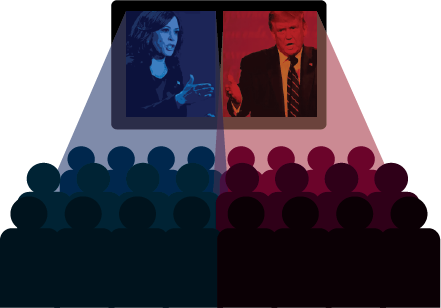

Caitlin Herz | News Editor | cherz@mail.smcvt.edu
The first presidential debate of 2024 on June 27 changed the race, setting Vice President Kamala Harris against former President Donald Trump after the withdrawal of President Joe Biden.
St. Michael’s College students gathered around their televisions to watch the Trump and Harris debate on September 10, and shared their perspectives on what motivates them politically along with their reaction to the debate.
Samuel Dalton, ’26, studying business administration, said he felt the presidential debate was a joke in a way, especially with the media fixating on the “they’re eating cats and dogs” statements from Trump.
Geoffrey Skelley, an elections analyst working for ABC News, said debates can be political performances, and a lot of people who watch the debate are “essentially cheerleading.”
The vice-presidential debate between Gov. Tim Walz of Minnesota and Senator JD Vance of Ohio was held on October 1.
The vice-presidential debate was received differently than the presidential debate between Trump and Harris.
After watching the debate, Meg Clements, ’26, a political science major, said she was pleasantly surprised with the way both candidates interacted with each other.
Clements said, “That was a breath of fresh air. I enjoyed the way Tim Walz discussed abortion rights and Vance definitely came off more likable than expected.”
Skelley spent time looking at the polls before and after the presidential debate to see if there were any changes on the opinions of the candidates.
While he believes debates certainly inform citizens on the candidates and policies, Skelley said “If you look at the polls, they have not moved very much in response to the debate.”
“I think that speaks to the fact that the country is very polarized, and most people who have an opinion are going to stick with who they plan to vote for.”
After watching the debate between Harris and Trump, Norah Beckwith, ’26, studying digital media and communications said, “I appreciated Kamala’s message of trying to bring us together. We have more in common than we have differences,”said Beckwith.
Skelley said that because Harris is a new candidate, the presidential debate was critical because she isn’t as well-known amongst voters as Trump and Biden. He said the debate was an opportunity for her to show citizens her potential as a candidate.
“I feel that Harris and Trump are discussing a few important issues, but there are so many more issues in our country,” said Grace Kennedy,’26, a political science student.
“Specifically how Harris has yet to call the war in Gaza a genocide. If she did this, it would confirm the feelings of many Americans who believe that the United States is compliant in this war and that change needs to happen,” said Kennedy.
Students at St. Michael’s College have a variety of different motivations behind their vote.
Thalia Guarnieri ’26 said that they are thinking about marginalized groups when voting even if that’s not their own identity. They want to protect the rights of those who are less privileged or who don’t have the opportunity to vote.
St. Michael’s College is located in the blue state of Vermont, but students’ political beliefs on campus are across the spectrum.
“I feel that our campus is quietly divided. Once the election comes closer, I think that we will start seeing more polarization among students,” Kennedy said.

